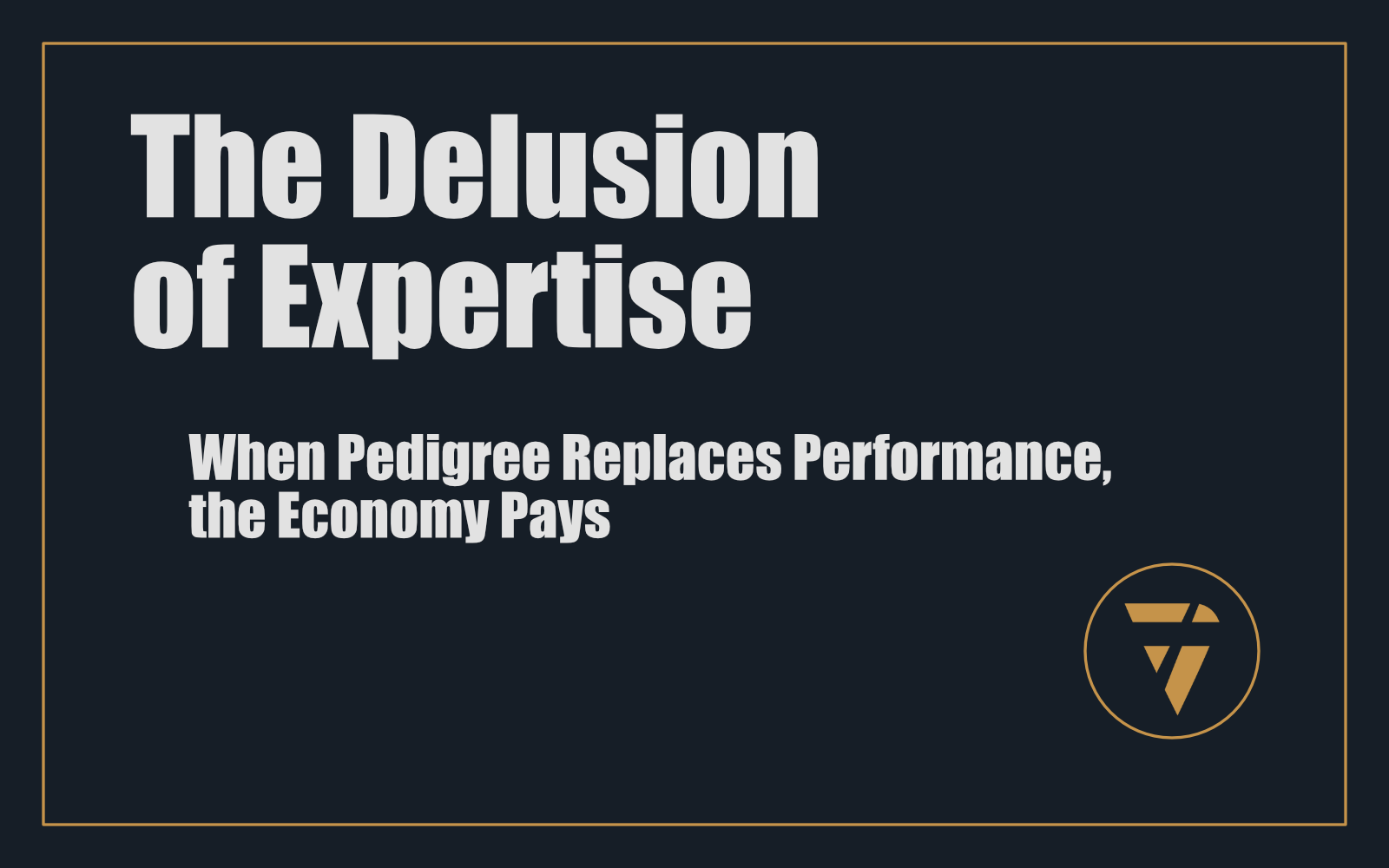The Delusion of Expertise

When Pedigree Replaces Performance, the Economy Pays
They did everything right. Top of their class. Letters behind their name. Six figures before thirty. But if they’re so smart... why are they still stuck selling time? Why can’t they scale? Why do they burn out businesses they were never trained to run?
The answer isn’t ambition. It’s architecture. We built a system that confuses motion with mastery... and now our best minds are trapped in roles that reward power, but punish performance. This is the quiet collapse of the professional class. And it’s time we stop applauding their success... and start questioning the system that made it feel like enough.
I.THE FANTASY WE SOLD TO A GENERATION
We live in a culture that canonises the educated.
Doctors. Lawyers. Accountants. Engineers. Bankers. Researchers.
We call them professionals. We treat them as elites. We trust them with our health, our money, our futures. We assume that because they hold advanced credentials, they also hold strategic clarity. That because they command high incomes, they understand how capital works. That because they lead in the courtroom or the operating room, they can lead in the market.
This is the central lie:
That professionals are entrepreneurs.
That specialists are builders.
That technicians are leaders.
They’re not.
And they were never meant to be.
II. THE STRUCTURE THAT SHAPED THEM
The professional class did not grow up in risk.
It grew up in sequence.
- Predictable households.
- Approved paths.
- Safe choices.
- Deferred gratification.
- A long road paved in awards, certifications, and institutional praise.
Most professionals were born into systems that rewarded compliance. They succeeded because they mastered those systems. They excelled because they performed well under structure.
And now?
Now we’ve pushed them into a world that requires the exact opposite.
- Fluidity.
- Adaptation.
- Pattern recognition.
- Market perception.
- Decisive risk.
And they’re drowning.
Because when structure is removed, they stall.
When no one tells them what to do, they freeze.
When the future is unclear, they retreat into work, not motion.
III. THE BLIND SPOTS OF THE PROFESSIONAL CLASS
Let’s name them.
These are not judgements... they are systemic consequences:
- No financial leverage literacy.
They understand budgeting, not capital deployment. They know how to earn. Not how to multiply. - No entrepreneurial pattern recognition.
They were trained to spot flaws, mitigate risk, and prevent failure, not to read signals, take asymmetric bets, or ride volatility. - No marketing instinct.
They’ve never had to craft offers. Never had to create demand. Their clients walked in the door because the system sent them. - No sales DNA.
They see persuasion as manipulation. They see promotion as beneath them. They would rather starve in silence than ask for attention. - No structural architecture.
They think in terms of appointments, not assets. In terms of tasks, not systems. They build jobs, not businesses.
And the most dangerous blind spot of all?
- They think their expertise is enough.
That the world will come to them.
That excellence will attract income.
That convention will lead to prosperity.
But the market doesn’t work that way.
The world has never actually worked that way.
IV. THE INSTITUTIONAL ABANDONMENT
So what do we do?
We hand these professionals degrees.
We praise them.
We put them on pedestals.
And then, we abandon them.
We send them out into the world with no operational training. No capital architecture. No strategic lens.
We tell a new doctor, “Go open a practice.”
We tell a new lawyer, “Go build a book.”
We tell a new accountant, “Go find clients.”
And then we wonder why they collapse.
We treat their burnout as personal weakness.
We treat their confusion as poor planning.
We treat their financial struggles as anomalies.
But they’re not anomalies.
They’re outcomes.
Perfect outcomes of a broken system.
V. WHY THIS IS A NATIONAL ECONOMIC THREAT, NOT A PERSONAL FLAW
This isn’t just about individual careers.
This is a national productivity crisis.
Because when the most educated people in society — the ones who could build, scale, lead — are shackled by operational ignorance and financial anxiety, we lose more than talent.
We lose momentum.
We lose innovation.
We lose the compounding effect of hundreds of thousands of minds who are trained to be brilliant... but never trained to be free.
They stall out at $250K/year.
They build no assets.
They take no equity.
They create no jobs.
They own no infrastructure.
And they pass this limitation on to the next generation... professionally respectable, financially constrained, structurally blind.
VI. THE SOLUTION ISN’T MORE COURSES. IT’S A NEW CONTRACT.
We don’t need more MBA crash courses.
We don’t need more soft skills workshops.
We need a structural rewiring of how we treat professional talent.
Start with this premise:
Professionals are precision instruments, not generalists.
They are not meant to run every system.
They are meant to sit at the centre of the system they were trained to lead.
So surround them.
- With operators.
- With strategic partners.
- With capital advisors.
- With platform architects.
- With teams that understand motion, not just mastery.
We don’t need to turn doctors into entrepreneurs.
We need to protect their clinical genius by wrapping it in commercial clarity.
We don’t need lawyers to become marketers.
We need to place them in ecosystems where positioning, demand generation, and financial modelling are handled by people who live for it.
We don’t need researchers to pitch VCs.
We need capital architects who can translate science into investable structure.
The professional’s role is not to run the whole show.
It’s to be the irreplaceable centre.
VII. CLOSURE: THE NEW ORDER IS COLLABORATIVE, OR IT COLLAPSES
This era is not about solo mastery. It’s about interlocked excellence.
You don’t win by being the smartest in the room.
You win by being the most structurally supported.
So let’s stop pretending professionals should also be founders.
Let’s stop forcing them into jobs they weren’t trained for.
Let’s stop confusing income for intelligence, and title for clarity.
And let’s start building what we always needed:
A system where the best minds don’t just work hard.
They build legacy.
Because we built the system around them... not on top of them.
This is what I’m working on. Tell me what you think, I enjoy the conversation! Subscribe and follow the work in real time.
Thanks!
B

They earn like founders. Work like employees. Think like technicians.
We trained an entire class to chase mastery... then wondered why none of them built anything.
PS -






